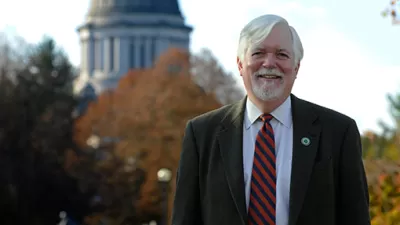Roger Millar, secretary of the Washington Department of Transportation, critiqued the status quo of statewide approaches to transportation planning and investment.

Angie Schmitt shares news of a progressive leader at a state department of transportation—usually bastions of the status quo for transportation planning and engineering.
The subject of the article, Roger Millar, the head of the Washington Department of Transportation, recently addressed the annual gathering of the American Association of State Highway and Transportation Officials (AASHTO) in Spokane last week, and Schmitt provides some of the perhaps surprising details of that speech.
Like, for instance, Millar saying that despite one of the highest gas taxes in the country, Washington can't afford more highway widening projects. " "About 71 percent of the state’s gas tax revenue is consumed by interest payments to pay off previously completed projects, he told AASHTO’s Joint Policy Committee."
That's not all. "The underlying cause of traffic congestion in the state of Washington is not insufficient road infrastructure, Millar said, but the dearth of “affordable housing and transportation solutions.” While people who can afford to live in city centers may have good transit options, housing in those areas is so scarce that lower-income residents are forced into long car commutes, he said…"
Schmitt is sharing news first broadcast by the AASHTO Journal.
FULL STORY: Washington State DOT Chief: Fixing Congestion With Highways “Fiscally Impossible”

Planetizen Federal Action Tracker
A weekly monitor of how Trump’s orders and actions are impacting planners and planning in America.

Maui's Vacation Rental Debate Turns Ugly
Verbal attacks, misinformation campaigns and fistfights plague a high-stakes debate to convert thousands of vacation rentals into long-term housing.

San Francisco Suspends Traffic Calming Amidst Record Deaths
Citing “a challenging fiscal landscape,” the city will cease the program on the heels of 42 traffic deaths, including 24 pedestrians.

Amtrak Rolls Out New Orleans to Alabama “Mardi Gras” Train
The new service will operate morning and evening departures between Mobile and New Orleans.

The Subversive Car-Free Guide to Trump's Great American Road Trip
Car-free ways to access Chicagoland’s best tourist attractions.

San Antonio and Austin are Fusing Into one Massive Megaregion
The region spanning the two central Texas cities is growing fast, posing challenges for local infrastructure and water supplies.
Urban Design for Planners 1: Software Tools
This six-course series explores essential urban design concepts using open source software and equips planners with the tools they need to participate fully in the urban design process.
Planning for Universal Design
Learn the tools for implementing Universal Design in planning regulations.
Heyer Gruel & Associates PA
JM Goldson LLC
Custer County Colorado
City of Camden Redevelopment Agency
City of Astoria
Transportation Research & Education Center (TREC) at Portland State University
Jefferson Parish Government
Camden Redevelopment Agency
City of Claremont





























